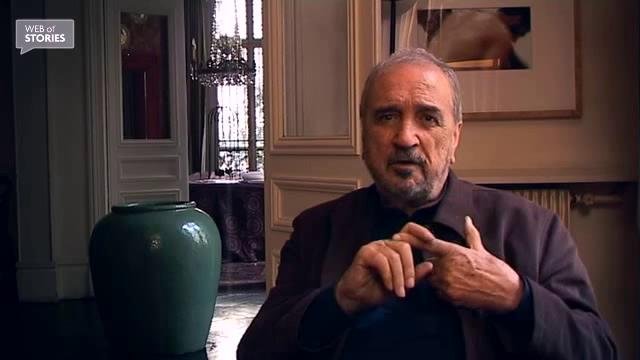NEXT STORY

A screenwriter must know more than how to write
RELATED STORIES

NEXT STORY

A screenwriter must know more than how to write
RELATED STORIES


|
Views | Duration | |
|---|---|---|---|
| 51. The Buddhist perception of the world | 2 | 167 | 02:10 |
| 52. Conversations about the invisible | 153 | 01:21 | |
| 53. What is knowledge? | 144 | 00:59 | |
| 54. Hubert Reeves | 106 | 00:24 | |
| 55. The search for certainty leads only to confusion | 1 | 136 | 03:04 |
| 56. Grasping the absolute | 1 | 113 | 01:28 |
| 57. Creating credible characters | 169 | 00:54 | |
| 58. The new technologies of the 20th century | 149 | 00:52 | |
| 59. A screenwriter must know more than how to write | 1 | 207 | 01:15 |
| 60. Jean-Louis Barrault | 1 | 109 | 02:46 |


I don’t consider anything important, of course, but rather as being agreeable and interesting, the fact of having been born in a century that invented so much new writing, so many new languages, it is the first one in history [to have done so]. If we were in the 19th century, we could only speak about theatre and books, but we’ve had cinema, sound recording and voice recording, then radio, then television, then speaking films, and then new images and all the things developed from information technology. Each new technique needed the invention of a new language, and it’s thrilled me for my entire life. I hope to have succeeded in exploring some of those new languages, new writings. That is all I can say, I don’t prefer any.
Je ne considère rien comme important bien entendu, mais plutôt comme agréable, et intéressant, le fait d’être né dans un siècle qui a inventé de nouvelles écritures, de nouveaux langages, il est le premier dans l’histoire. Si nous étions au XIXe siècle nous ne pourrions parler que de théâtre et de livres et nous avons eu successivement le cinéma, l’enregistrement du son et de la voix, et puis la radio, et puis la télévision, et puis le cinéma parlant… et puis les nouvelles images et tout ce qui l’informatique nous a apporté. Chaque nouvelle technique a nécessité l’invention d’un nouveau langage et ça m’a totalement passionné toute ma vie. J’espère avoir réussi à explorer certains de ces nouveaux langages, de ces nouvelles écritures. C’est tout ce que je peux dire, il n’y a pas une que je préfère à l’autre.
French screenwriter Jean-Claude Carrière (1931-2021) began his association with films aged 24 when he was selected by Jacques Tati to write for him. This early experience led to further contact with other film-makers, including Luis Buñuel with whom Carrière collaborated for many years. He wrote screenplays for films including Belle de Jour, The Discreet Charms of the Bourgeoisie, Tin Drum and Danton.
Title: The new technologies of the 20th century
Listeners: Andrzej Wolski
Film director and documentary maker, Andrzej Wolski has made around 40 films since 1982 for French television, the BBC, TVP and other TV networks. He specializes in portraits and in historical films. Films that he has directed or written the screenplay for include Kultura, which he co-directed with Agnieszka Holland, and KOR which presents the history of the Worker’s Defence Committee as told by its members. Andrzej Wolski has received many awards for his work, including the UNESCO Grand Prix at the Festival du Film d’Art.
Tags: Cinema, radio, television, information technology, literature, technology
Duration: 52 seconds
Date story recorded: January 2010
Date story went live: 18 October 2010